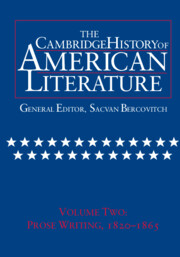Book contents
- Frontmatter
- Introduction
- CONDITIONS OF LITERARY VOCATION
- THE LITERATURE OF EXPANSION AND RACE
- THE TRANSCENDENTALISTS
- NARRATIVE FORMS
- 1 Establishing National Narrative
- 2 Local Narratives
- 3 Personal Narratives
- 4 Literary Narrative
- 5 Crisis of Literary Narrative and Consolidation of National Narrative
- Chronology
- Bibliography
- Index
3 - Personal Narratives
from NARRATIVE FORMS
Published online by Cambridge University Press: 28 March 2008
- Frontmatter
- Introduction
- CONDITIONS OF LITERARY VOCATION
- THE LITERATURE OF EXPANSION AND RACE
- THE TRANSCENDENTALISTS
- NARRATIVE FORMS
- 1 Establishing National Narrative
- 2 Local Narratives
- 3 Personal Narratives
- 4 Literary Narrative
- 5 Crisis of Literary Narrative and Consolidation of National Narrative
- Chronology
- Bibliography
- Index
Summary
Local narratives partake of place; personal narratives arise from and depend on displacement: Pacific voyages, overland journeys to the frontier, slaves' escapes, or even a displacement as small as Thoreau's within Concord. This displacement is physical, but it also defines the fundamental rhetorical situation of the narratives: their intelligibility and force depend on the difference between the world that the reader knows, and reads within, and the world that the narrator has experienced. Etymologically, the Latin word from which “narrative” derives is closely related to the adjective gnarus, “knowing.” The relation of narrative to individual life-knowledge is sharper in this kind of narrative than in any of the others studied here. In the terminology of classical oratory, the “narration” was the plain and manifest setting forth of the facts of the case. Such an emphasis on plainness and focus on externals typify these narratives. They pay much less attention to the shifting nuances of personal, and especially interpersonal, feeling, than would be expected in a novel.
As reports of activity on the margins of national life, these personal narratives are more like the genre of captivity narrative stemming from Mary Rowlandson's account of her life among the Indians (1682) than they resemble the narratives of inner religious experience, which Jonathan Edwards's “personal narrative,” dating from around 1740, exemplifies. For the more privileged white authors, personal narratives characteristically have the circular shape of descent and return – a touching of ground, even a humiliation before the return to the elevation of ordinary civilized life; for slave narrators, the more usual pattern is that of an ascent to freedom.
- Type
- Chapter
- Information
- The Cambridge History of American Literature , pp. 661 - 692Publisher: Cambridge University PressPrint publication year: 1995

